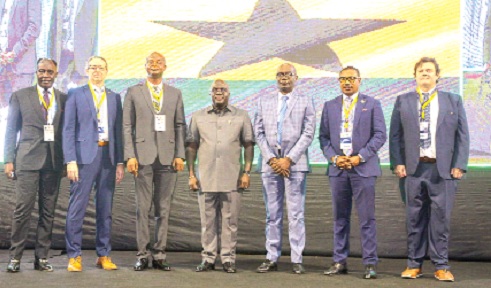The Chief of Staff, Julius Debrah, has called on internal auditors to support the government’s ongoing economic reset agenda, emphasising their crucial role in promoting transparency, accountability and prudent financial management of public institutions.
He said internal auditors remained key partners in the government’s quest to strengthen financial discipline and ensure value for money in the use of public funds.
Mr Debrah, therefore, urged them to continue flagging potential financial infractions while advising management on risk mitigation measures to safeguard national resources.
“Internal auditors must act as champions of transparency and guardians of financial accountability. Sustained growth and development can only be achieved when the pillars of accountability are strong,” he added.
Mr Debrah was speaking at this year’s annual Internal Audit conference in Accra yesterday. The three-day event is on the theme: “Resetting the Ghanaian economy: The role of the internal auditor.”
Intensification of efforts
The Chief of Staff further urged internal auditors to intensify efforts to ensure that the government programmes delivered measurable benefits to citizens.
“Every cedi spent must reflect in the lives of the people. Our citizens must see and feel the impact of their taxes through improved roads, health care and education,” he said.
Mr Debrah also reminded auditors of their obligations under the Public Financial Management Act (Act 921) and other financial regulations of managing institutional risks, reviewing governance practices, and ensuring compliance with procurement and financial laws.
While acknowledging the significant contributions of internal auditors to the government’s fiscal reforms, he said more work remained to be done.
The Chief of Staff underscored the need for continuous collaboration among auditors, management and policymakers to entrench good governance and efficiency in public sector operations.
He said that the government’s reset agenda spanned multiple sectors — finance, agriculture, education, health, energy and infrastructure, all aimed at restoring macroeconomic stability and achieving sustainable growth.
Mr Debrah highlighted the progress made in key economic indicators such as the fall of inflation to below 10 per cent, stabilisation of the exchange rate and the downward trend of the nation’s debt-to-GDP ratio.
Concerns
The acting Director-General of the Internal Audit Agency (IAA), Tomas Ashaley Thompson-Aryee, expressed concern about the non-functionality of Audit committees across some public institutions, describing it as a major setback to accountability.
He said that many committees depended on their respective covered entities for funding, which often compromised their independence and delayed the enforcement of audit recommendations.
To address the issue, Mr Thompson-Aryee said the IAA was working with the Ministry of Finance and other stakeholders to establish a dedicated funding arrangement for Audit committees, including developing a formal communication protocol between the Public Accounts Committee (PAC) and Audit committees.
He further appealed to the government to review the conditions of service for internal auditors, citing disparities between auditors and their counterparts in other financial oversight institutions such as the Controller and Accountant-General’s Department, the Ghana Revenue Authority and the Ghana Audit Service.
“Despite the vital role internal auditors play in safeguarding public resources, their conditions of service have not kept pace with their growing responsibilities. A fair review will boost morale, reduce attrition and enhance fiscal discipline across the public sector,” he added.
Mr Thompson-Aryee reaffirmed the agency’s commitment to advancing reforms that would strengthen internal auditing as a cornerstone of good governance and a key driver of the country’s economic recovery.

